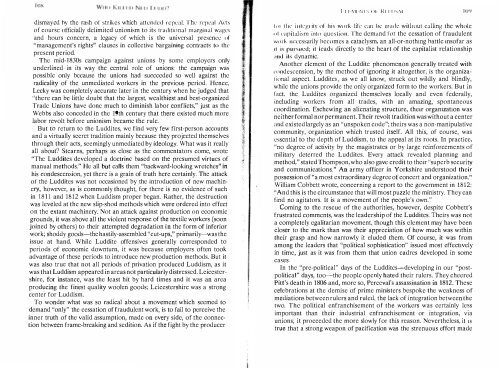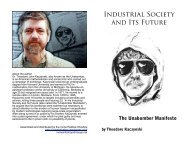CONTENTS - ouroboros ponderosa
CONTENTS - ouroboros ponderosa
CONTENTS - ouroboros ponderosa
Create successful ePaper yourself
Turn your PDF publications into a flip-book with our unique Google optimized e-Paper software.
IllS<br />
dismayed hy the rash of strikes which attended repeal. Th" rcpcal Acts<br />
of course OffiCially delimited unionism to its traditional m arginal wages<br />
and hours concern, a legacy of which is the universal presence of<br />
"management's rights" clauses in collcctivc hargaining contracts to the<br />
present period.<br />
The mid-1830s campaign against unions by some employcrs only<br />
underlined in its way the central role of unions: the campaign was<br />
possiblc only because the unions had succceded so well against the<br />
radicality of the un mediated workers in the previous period. Hence,<br />
Lecky was completely accurate later in the century when he judged that<br />
"there can be little doubt that the largest, wealthiest and best-organized<br />
Trade Unions have donc much to diminish labor conflicts," just as the<br />
Webbs also conceded in the 19th century that there existed much more<br />
labor rcvolt bcfore unionism became thc rulc.<br />
But to return to the Luddites, we find very few first-person accounts<br />
and a virtually secret tradition mainly because they projected themselves<br />
through their acts, seemingly unmediated hy ideology. What was it really<br />
all about? Stearns, perhaps as close as the commentators come, wrote<br />
"The Luddites developed a doctrinc based on the prcsumed virtues of<br />
manual methods." He all but calls them "backward-looking wretches" in<br />
his condescension, yet there is a grain of truth here certainly. The attack<br />
of the Luddites was not occasioned by the introduction of new machinery,<br />
however, as is commonly thought, for there is no evidence of such<br />
in 1811 and 1812 whcn Luddism proper began. Rather, the destruction<br />
was leveled at the new slip-shod methods which were ordered into effect<br />
on the extant machinery. Not an attack against production on economic<br />
grounds, it was above all the violent response of the textile workers (soon<br />
joined by others) to their attempted degradation in thc form of inferior<br />
work; shoddy goods-the hastily-assembled "cut-ups," primarily-was the<br />
issue at hand. Whilc Luddite offensives generally corresponded to<br />
periods of economic downturn, it was because employers often took<br />
advantage of these periods to introduce new production methods. But it<br />
was also true that not all periods of privation produced Luddism, as it<br />
was that Luddism appeared in areas not particularly distressed. Leicestershire,<br />
for instance, was the least hit by hard times and it was an area<br />
producing the finest quality woolen goods; Lcicestershirc was a strong<br />
center for Luddism.<br />
To wonder what was so radical about a movement which seemed to<br />
demand "only" the cessation of fraudulent work, is to rail to perceive the<br />
inner truth of the valid assumption, madc on every side, of the connection<br />
betwecn frame-breaking and sedition. As if the fight by the producer<br />
i ll,r-.,l l'NT\ 1)1, \,1 1- ]1":\1 11)1 J<br />
lIn lIlt, illlL'gl'i1v of lIis work--lik loall he l11 aliL: willlUul calling the whole<br />
,,[" capital ism illto question. The demand for the cessation of fraudulent<br />
wo .. necessarily hecomes a cataclysm, an all-or-nothmg hattlc Insofar as<br />
i1 is pursued; it leads directly to the heart of the capitalist relationship<br />
and its dynamic.<br />
.<br />
Another clement of the Luddite phenomenon gencrally treatcd With<br />
mlldescension, by the method of ignoring it altogether, is the organiza-<br />
1 ional aspect. Luddite" as we all know, struck out wildly and blindly,<br />
whilc the unions provide the only organized form to the workers. But In<br />
fact, the Luddites organized themselves locally and even federally,<br />
induding workers from all trades, with an amazing, spontaneous<br />
coordination. Eschewing an alicnating structure, theIr orgamzalton was<br />
neither formal nor permanent. Their revolt tradition was without a center<br />
ilnd existed largely as an "unspoken code"; theirs was a non-manipulative<br />
community, organization which trusted itself. All this, of course, was<br />
csscntial to the depth of Luddism, to the appeal at its roots. In practIce,<br />
"no degree of activity by the magistrates or by large reinforcements of<br />
military deterred the Luddites. Every attack reveale planmng and<br />
method," stated Thompson, who also gave credit to theIr superb secunty<br />
and communications." An army officer in Yorkshire understood their<br />
possession of "a most extraordinary degree of concert and organization."<br />
William Cobbett wrote, concerning a report to the govcrnment III 1812:<br />
"And this is the circumstance that will most puzzle the ministry. They can<br />
find no agitators. It is a movemcnt of the people's own."<br />
Coming to the rescue of the authorities, howevcr, despite . Cobbett's<br />
frustrated comments, was the leadership of the Luddltes. TheIrS was not<br />
a completely egalitarian movement, though this element may have ben<br />
closer to the mark than was their appreciation of how much was wlthm<br />
their grasp and how narrowly it eluded them. Of course, it ,,:as from<br />
amono the leaders that "political sophistication" issued most effectIvely<br />
in ti;e, just as it was from them that union cadres dcveloped in some<br />
cases.<br />
In the "pre-political" days of the Ludditcs-developing in our "postpolitical"<br />
days, too-the peoplc opcnly ha!ed their rulers . . They cheered<br />
Pitt's death in 1806 and, more so, Perceval s assassmatlon m 1812. The,e<br />
celebrations at the demise of prime ministers bespoke the weakness of<br />
mediations between rulers and ruled, the lack of integration between the<br />
two. The political enfranchisement of the workers was certainly les<br />
important than their industrial enfranchisement or mtegratIon, . Via<br />
unions; it proceeded the more slowly for this reason. Nevcrtheless, It IS<br />
true that a strong weapon of pacification was the strenuous effort made






